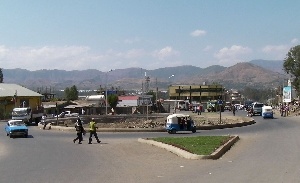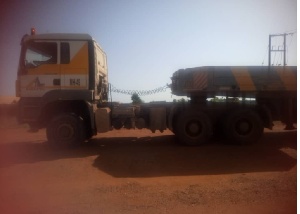Africa News of Wednesday, 2 April 2025
Source: www.ghanawebbers.com
Ethiopia's Civil War - What's Behind the Amhara Rebellion?
Ethiopia is experiencing a civil war. This conflict involves federal government forces and the Fano militia in the Amhara region. The fighting began less than a year after the Tigray war ended in 2022.
The Amhara are one of Ethiopia's largest ethnic groups. They played a significant role in forming the Ethiopian state. Amharic is the country's working language. The Amhara region borders Tigray, where various Fano groups allied with the federal government during the Tigray war.
A peace deal in 2022 sidelined these militia groups, straining relations with the government. The conflict started with minor clashes in April 2023 but escalated into an insurgency by August. Fano forces launched attacks to control major cities in the region.
Since then, violence has displaced over 100,000 people. It has also left 4.7 million children out of school. The death toll continues to rise; by March 2025, over 300 Fano fighters were reported killed.
Researchers studying Ethiopia's ethnic nationalism see three main factors behind this struggle: mismanaged political transition, fallout from the Tigray war, and ineffective peace efforts.
Between 1991 and 2018, Ethiopia was governed by a coalition called EPRDF. This coalition included four ethno-national parties representing different regions: Tigray, Amhara, Oromo, and Southern nations.
In response to unrest in 2014, two members of this coalition joined forces against TPLF dominance. They leveraged youth-led protests between 2015 and 2018 to achieve this goal.
After Prime Minister Hailemariam Desalegn resigned in 2018, Abiy Ahmed rose to power with their support. Initially, it seemed like Oromo and Amhara factions were equal partners; however, this changed quickly.
In December 2019, Abiy merged all parties into one called Prosperity Party. The Oromo faction became dominant within this new party and controlled key positions and resources.
Amhara leaders who criticized this dominance faced removal or exile. In June 2019, Ambachew Mekonnen, president of Amhara region, was assassinated.
Residents faced harassment and violence when trying to enter Addis Ababa. These incidents sparked anti-government protests throughout Amhara.
The Tigray war ended with a peace agreement signed in South Africa in late 2022. However, it deepened feelings of marginalization among Amharas since they had no representation at talks despite being affected by the conflict.
The agreement also left unresolved territorial disputes between Amhara and Tigray regions like Welkait. In April 2023, the government announced plans to dismantle regional special forces under the guise of consolidating military power.
This move was seen as an attempt to weaken Amhara defenses while leaving Tigray Defense Forces intact at over 200,000 strong. Public protests erupted into clashes with government forces that evolved into an insurgency led by Fano months later.
The insurgency has gained public support across both local communities and diaspora populations. It operates across territory three times larger than Tigray which stretches federal military resources thinly.
Different factions within Fano have varying goals ranging from protecting Amhara interests to seeking constitutional changes or overthrowing the federal government itself. However, they lack unified leadership or clear objectives at present due to internal divisions.
The government's response has been forceful; it declared a state of emergency for six months starting August 2023 which was later extended indefinitely despite officially ending in June 2024 with some restrictions still enforced including curfews in major cities like Bahir Dar.
Counterinsurgency efforts rely heavily on deploying Ethiopian National Defence Forces along with drone strikes against insurgents while simultaneously expressing openness towards peace talks without taking meaningful steps such as releasing political prisoners from detention camps across regions affected by unrests recently experienced throughout Ethiopia’s history leading up until now .
A Peace Council aimed at mediating between both sides has proven ineffective due largely because federal authorities show reluctance towards negotiations altogether instead focusing primarily on calls for unconditional surrender from rebel fighters involved within these ongoing conflicts currently plaguing parts surrounding northern areas near borders adjacent neighboring countries nearby too!











